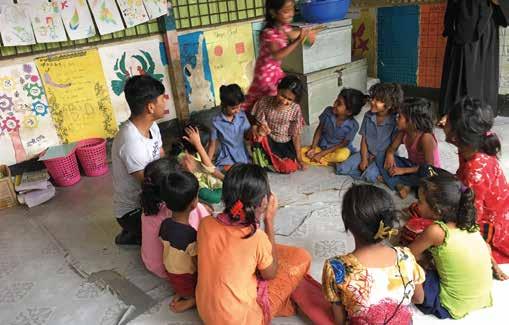
3 minute read
Jon Biddle’s Reading for pleasure
ABOUT 50 NEU members (left) from London volunteered with charity Care4Calais in January to show solidarity with migrants, who are facing an increasingly hostile environment. They worked in the warehouse and distributed 450 winter coats, 200 pairs of boots and 100 power packs to refugees and migrants in Calais and Dunkirk. n Care4Calais will have a stall at annual conference in April.
Bangladesh permits Rohingya education
THERE has been a breakthrough for half a million Rohingya children living in crowded refugee camps in Bangladesh.
At the end of January, the government in Dhaka announced that it would offer them formal schooling and skills training.
It comes two-and-a-half years after numbers in the camps surged as the Rohingya escaped a deadly offensive in Burma, which the UN described as “a textbook example of ethnic cleansing”.
Until now, refugee children have only received very basic education from aid agencies and local organisations, prompting observers to warn of a “lost generation”.
Sirazul Islam was born in the camps but came to the UK in 2008 and now studies law at Manchester University. He is youth advocate for British Rohingya Community UK. He spoke to Educate after returning from a visit to Kutupalong camp.
“I’d like to thank the Bangladeshi government for its decision to allow more than 100,000 Rohingya children to be educated [in the pilot programme]. That’s an entire generation, saved from illegal activities and bad things they might dive into. Without education it is easy to manipulate and radicalise people. “We must be wary, however, because many times in the past we’ve seen the Bangladeshi establishment order something, without it being implemented on the ground.”
If it goes ahead, what will change? “The education system that I was in for eight years until I came to the UK only lasted until age 14. What are you supposed to do then? “The curriculum was very basic. In English, you only learned the alphabet, it wasn’t adequate to be able to speak English. Maths was just counting from one to 50.
“The government says the curriculum will be more formal, similar to the Bangladeshi schooling system, and after the age of 14 they’ll provide workshops in life skills.”
What was the reaction in the camps? “When the government announced the plan, the happiness on children’s faces showed how keen they are on learning. The one thing they said to me they wanted was formal education. This is close to everyone’s heart.
“The camps have become more and more overcrowded. When I left in 2008 there were 100,000 people there, now it is 1.5 million in the same space and diseases spread quickly.

“An eight-year-old described it to me as an ‘open prison’. The camps are surrounded by metal wire, making it hard for people to move in and out. Imagine how you would feel, for 30 years being unable to leave the camp.
“I was in the camp for just one month and I felt I was suffocating. The hospitality that Bangladesh has shown us is unmatched, but it’s hard for a poor country that has seen 1.5 million refugees come over its border.
“Now, they’ve cut off all mobile data – to get internet, you have to buy wifi from shops. This means people can’t even find out what is going on with their own struggle in Burma. “When I came to the UK, I was given an amazing opportunity, to be educated and be human again. Imagine if we gave the same opportunity to the children in the camps.” Visit britishrohingya.co.uk










